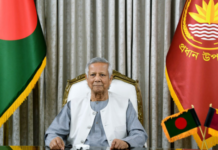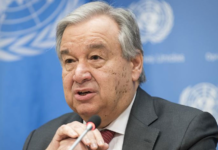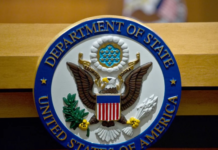
By William Gomes 4 May 2023
On the 26th of April 2023, Mohammad Mofijul Islam, the officer in charge of the Jatrabari police station of Dhaka Metropolitan Police in Bangladesh, recorded a general diary alleging that I, William Gomes, a freelance journalist and Bangladeshi living in the UK, committed a crime under Section 21 of the DSA. The general diary accused me of engaging in propaganda and campaigning against the liberation war, the spirit of liberation, the national anthem, and the national flag. The police document claimed that I wrote an anti-state poem, which was published in various media outlets, including the world-renowned Huffington Post, where I called for the burning of Bangladesh’s red and green flags. The general diary also asserts that I did not do this just once; I continued doing it, even appearing on Australian ABC radio and claiming that Bangladeshi freedom fighters are war criminals. The general diary stated that I used my Twitter account, with 41.6K followers, and wrote for different media outlets. It further mentioned that I wrote in the Huffington Post and alleged that the International Crimes Tribunal (Bangladesh) had outrageous levels of corruption, bias, and falsification following the sentencing of Prof Ghulam Azam. The official police document says that I also suggested that convicted war criminal Ghulam Azam should receive the Nobel Peace Prize and called for the trial of the Father of the Nation, Bangabandhu Sheikh Mujibur Rahman Sheikh Mujib, for war crimes. The official document claims that in the past, I have threatened to kill Sheikh Hasina Wazed and her son Joy.
Let me start by debunking one significant lie: I am a peaceful person, a freelance journalist and human rights activist; I have never threatened to kill Sheikh Hasina Wazed and her son Joy.
I am not sure where Bangladesh is heading. A truly vibrant and democratic society requires the unrestricted ability to express oneself without fear of retribution. In Bangladesh, journalists, academics, and critics of the government are incessantly attacked, and the government does everything in its power to suppress them. I wonder when it became illegal to write poems, articles, give interviews, or engage in critical discussions of a nation’s past. The Bangladeshi police and government want to throw me behind bars for what is essentially journalism.
As the author of the poem “Anti State,” I felt compelled to write this piece to express my discontent and disillusionment with the state and its governing systems. Witnessing the injustices and corruption perpetrated by the state, I was driven to use poetry as a medium to voice my dissent and to raise awareness of the oppressive structures that govern our lives.
“Anti State” is a fierce critique of the state and its role in perpetuating various societal issues such as injustice, poverty, and hatred. I wanted to convey my unwavering opposition to the state’s institutions, which is why I repeatedly declared myself as “ANTI STATE” throughout the poem. My resistance is rooted in the belief that the state is inherently corrupt and unjust, and I am determined to challenge and dismantle its oppressive systems.
In writing this poem, I aimed to explore the power dynamics between the state and the people, highlighting how the state and its leaders manipulate and exploit the population to maintain their grip on power. I condemned the state for its role in creating poverty, asserting that the powerful thrive when people are poor. Similarly, I accused the state of selling hatred and religious conflict, suggesting that these divisions are used as tools to control the masses.
To convey these ideas effectively, I employed various poetic techniques, such as repetition, vivid imagery, metaphors, and symbolism. The repetition of phrases like “I am against” and “I declare” emphasizes my unwavering stance and determination to challenge the state. Vivid descriptions of the state as a “corporate state of injustice” and a “trader of injustice” paint a striking picture of its corrupt nature.
In the poem, I also used metaphors to describe the state and its leaders as “traders” and “sellers” of injustice, hatred, and religious conflict. This metaphorical language highlights the state’s greed and self-interest, characterizing it as a commercial entity that profits from societal discord. Symbolism plays an equally important role, with the burning of the “RED and GREEN flag” and the “constitution of injustice” serving as potent symbols of defiance against the state and its oppressive systems.
My poem “Anti State” is a passionate call to action, urging readers to stand up against the oppressive structures that perpetuate injustice and inequality. Through the use of passionate language, evocative imagery, and provocative themes, I hope to encourage people to question the status quo and to fight for a more just and equitable world.
I am not sure the police officers who entertained the general diary have the right taste or mindset to understand the poem. I was born in Bangladesh and am no lesser Bangladeshi than Sheikh Hasina Wazed; I still hold Bangladeshi citizenship. I have the right to question the nation’s past, and for that, I do not need permission from Sheikh Hasina Wazed, her government led by Bangladesh Awami League, or any subsequent government that might form in the near future in Bangladesh.
I want to critically engage with the selected, contested, and fragmented narrative of the 1971 war, its cause, reason, and its aftermath. The role of India and other international actors and geopolitical factors has been presented in a way that benefited the rulers and families who ruled Bangladesh for the last 50 years, but the selective narrative telling and history have not served the Bangladeshi people because the full truth was not told, and a half-baked truth was presented.
This presented India as a big friend, but questions need to be asked about the geopolitical interest of India in the 1971 war and whether the creation of Bangladesh was in India’s interest. These questions need to be asked with a chain of questions about what Sheikh Mujibur Rahman wanted out of the 1971 war. Did he want a new nation, Bangladesh? This question was never answered; a partisan answer was given, and there has been an attempt to portray a defected history of the 1971 war, which portrays a false hero and even names him as the father of the nation, a father who never wanted the nation in the first place. Possibly, Bangladesh is someone else’s mischief, and then Sheikh Mujibur Rahman was placed in a political situation in which the best option for him was to go with the claim that he wanted a separate nation, which is Bangladesh. Why did the freedom fighters in the post-1971 war kill Sheikh Mujibur Rahman and later many of the war heroes even killed many more of them, and some even remain fugitives today? The politics of revenge and vengeance has been haunting Bangladesh for the last 50 years; until we go back and engage with the root reason of the 1971 war and whether the war was avoidable and, in whose interest, the 1971 war took place, this nation will continue its mission of killing its own that started in 1971.
What has been repressed for the last 50 years will return again, and we will see false heroes turned into dictators, like Sheikh Mujibur Rahman, who was projected as a people’s leader. The nation will again choose leaders like Sheikh Hasina, who is a worse dictator than her father, Sheikh Mujibur Rahman. What has been repressed will return again and again; if we have not dealt with the repressed, we will see the birth of more and worse leaders than Sheikh Mujibur Rahman and Sheikh Hasina. The question remains: are the people of Bangladesh collectively punishing themselves by repeatedly choosing leaders like Sheikh Mujibur Rahman and Sheikh Hasina?
It can be argued that the collective unconscious of the Bangladeshi people might be influencing their choices in leadership, perpetuating a cycle of repression and the return of the repressed. This dynamic can result in the repeated selection of leaders who embody and perpetuate the unresolved traumas and conflicts of the nation’s past.
A reordering of the symbolic order is needed in Bangladesh. Changing the symbolic order could involve altering societal norms, values, and beliefs that encourage the rise of authoritarian figures. This might include promoting democratic principles, fostering critical thinking, and encouraging active participation in the political process. By creating a society that values individual freedoms, autonomy, and diversity of thought, people may be less inclined to turn to dictatorial leaders for stability and security. Reordering the symbolic order could help address some factors that contribute to people choosing dictatorial leaders, but it may not entirely resolve the issue due to the inherent complexities of human subjectivity and the unconscious.
Researchers should engage critically with the military coups in Bangladesh, and the 1971 enterprise and its aftermath need to be placed under a microscope, and people’s history needs to be rewritten, which will be separate from the ruling elites and families who have ruled Bangladesh for the last 50 years.
In my interview with Australian ABC radio, I questioned why the law does not have options to bring any litigation against Bangladeshi freedom fighters if they were involved in war crimes, why the law allows holding other parties of war for war crimes, and this is not right. I still stand on that position; the nation should leave no option to find whether, during the 1971 war, Bangladeshi freedom fighters were involved in any war crimes and bring them to justice.
My position about the International Crimes Tribunal (Bangladesh) is very clear, which is that it had outrageous levels of corruption, bias, and falsification.
Since 1971, there has been a continuous attempt to portray Sheikh Mujibur Rahman as an uncontested hero. The history of the 1971 war, as presented to us, is full of errors and partisanship. In the last 50 years, every attempt has been made to maintain the partisan histories. Now Section 21 of Bangladesh’s Digital Security Act has put the final nail; now, even an ordinary person like me would be put behind bars just for questioning the 1971 war and or questioning the biased and falsified history that has been fed to the nation for the last 50 years. People like Mohammad Mofijul Islam, the officer in charge of the Jatrabari police station of Dhaka Metropolitan Police, would take the opportunity to accuse me of being involved in making propaganda or campaigning against our liberation war of 1971, the spirit of liberation, the national anthem, or the national flag, and I am a dead man walking because if I were in Bangladesh, they would have tortured me to death and subjected me to enforced disappearance or I would have been languishing behind bars for the rest of my life. What a free country, where freedom of speech is a dream. I want to tell the families ruling Bangladesh for the last 50 years: give back the country to its nation, keep your father as your hero, and do not try to make them our heroes.
I am an ordinary person, a Bangladeshi-born individual who is initiating the demand for a rewriting and retelling of the history of the 1971 war and its aftermath, and the making of heroes who possibly are not heroes as they have been presented for years. It might sound foolish and fallacious at the moment, but in years to come, when ordinary people will ask the questions that I asked and more questions that I failed to ask, the day will come when asking these questions will not be a crime, and people will not be put behind bars. There will come a time when freedom of speech and journalism will not be criminalised in Bangladesh, and simply writing a poem will not result in someone being threatened with imprisonment and hefty fines, like the Bangladeshi authorities are doing to me. Who is the fool who dares to put an unknown and unimportant poet and freelance journalist like me behind bars? I want to tell the Bangladeshi authorities that if you put me behind bars, the whole prison will start writing poems, and the judges who give judgements to put me behind bars will start writing poems and will demand the overthrow of the family dynasty that has been ruling Bangladesh for the last 50 years. The whole nation will wake up, writing poems.
William Gomes is a freelance journalist and human rights activist. Email him at [email protected] or tweet him at @Wnicholasgomes.









